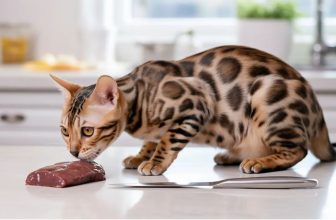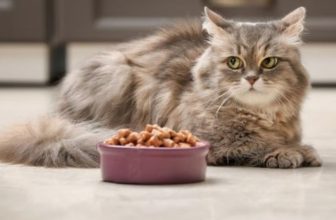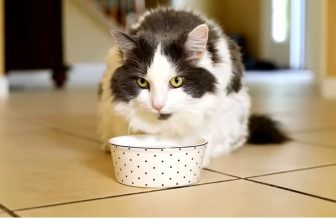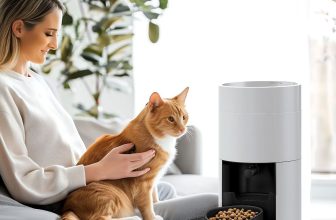What Food is Good for Cats? Best Guide line-2025

When it comes to your cat’s health, choosing the right food is just as important as providing them with love and attention. The food your cat eats plays a major role in their overall well-being, including their energy levels, coat quality, digestion, and longevity.
Whether you’re new to cat care or a seasoned pet owner, it’s essential to understand the nutritional needs of your cat to make the best food choices. This guide will help you navigate through different types of cat food and identify the best options based on your cat’s health, age, and any specific needs like allergies or sensitivities what food is good for cats.
Choosing the right food for your cat is one of the most important decisions you’ll make for their health. Cats have unique dietary needs that can vary depending on their age, health, and lifestyle. Whether your cat is a kitten, adult, or senior, understanding their specific needs will ensure that they get the nutrients required for a long and healthy life. Additionally, factors such as allergies, sensitivities, and weight management may influence your choice of food.
In this guide, we will explore the different types of cat food available and how to select the best one for your cat’s specific needs.

What Makes Good Cat Food?
When selecting food for your cat, it’s important to look for a balance of high-quality proteins, fats, vitamins, and minerals. Cats are obligate carnivores, meaning their bodies are designed to thrive on a meat-based diet. This means that proteins are the most essential part of their diet.
Proteins are the building blocks of your cat’s muscles, organs, and overall body structure. High-quality animal proteins like chicken, turkey, beef, and fish are the best sources of protein for your cat. These proteins provide the amino acids that cats need for muscle maintenance, energy production, and overall health.
Fats are another important component. They not only provide a concentrated source of energy, but they also help support the skin and coat. Healthy fats, such as omega-3 and omega-6 fatty acids, are essential for keeping your cat’s fur shiny and soft.
Additionally, vitamins and minerals play a vital role in supporting various bodily functions, including vision, immune health, and digestion. Taurine, for example, is a vitamin-like nutrient that is crucial for heart health and is found naturally in animal tissues.
When choosing cat food, it’s essential to avoid fillers such as corn and wheat, which provide little nutritional value. Look for foods that list meat as the first ingredient to ensure that your cat is getting the nutrition they need.

Best Food for Cats with Sensitive Stomachs
Cats with sensitive stomachs can experience digestive issues such as vomiting, diarrhea, or loss of appetite. If your cat exhibits any of these symptoms, it might be time to reconsider their food.
Food that is easy on a cat’s digestive system can help reduce discomfort. Hypoallergenic cat food is specifically formulated for cats with sensitivities. These foods typically have limited ingredients, which helps reduce the likelihood of triggering an allergic reaction. Common hypoallergenic ingredients include novel proteins like duck or venison, and grains like rice or barley, which are gentle on the stomach.
Additionally, some cat foods include probiotics, which help maintain healthy gut bacteria. Probiotics can aid in digestion, reduce gas, and prevent diarrhea, making them a great option for cats with sensitive stomachs.
If your cat suffers from food sensitivities, choosing a diet with easily digestible ingredients will help improve their quality of life.
Nutritious Food Options for Indoor Cats
Indoor cats have different nutritional needs than outdoor cats. Since indoor cats are typically less active, they may require fewer calories to maintain a healthy weight. Indoor cats are also more likely to experience issues like hairballs due to grooming, so the right food can help manage this concern.
Look for food that is high in fiber, as fiber helps with digestion and prevents hairballs from forming. Ingredients like pumpkin or psyllium husk can help your cat pass hairballs more easily.
Additionally, indoor cats often face the challenge of weight management. To avoid obesity, it’s important to feed them food that is lower in calories but still packed with high-quality protein. Some brands offer special formulas designed for indoor cats that help maintain a healthy weight while still providing all the necessary nutrients for overall health.
Choosing food designed for indoor cats will ensure that they stay at a healthy weight, prevent hairballs, and live a long, happy life indoors.

Top-Rated Cat Food for Healthy Fur
A shiny, healthy coat is a sign of a well-fed cat. The right food can help support the skin and fur, making your cat’s coat look glossy and beautiful. Cats with poor fur quality may suffer from dry skin, excessive shedding, or a dull coat. If you want your cat to have healthy fur, look for food that includes omega-3 and omega-6 fatty acids.
Fish oil, flaxseed, and other plant-based oils are great sources of omega fatty acids. These oils help keep your cat’s skin moisturized and support a shiny, smooth coat. Biotin, a vitamin that promotes healthy hair growth, is also important for skin and fur health.
Brands that emphasize skin and coat health will often include these ingredients to keep your cat’s fur in top condition.
What Should I Feed My Kitten?
Kittens have very different dietary needs than adult cats. They’re growing rapidly and need extra protein and calories to support their development. Kittens require higher amounts of protein, fat, and calcium to fuel their growth and support the development of their muscles, organs, and bones.
DHA, a type of omega-3 fatty acid, is vital for kittens, as it supports brain development. Look for kitten food that is specially formulated to provide these nutrients. Kitten food is also usually softer and easier to chew, making it more appropriate for their small teeth.
Feeding your kitten the right food will set them up for a healthy adulthood, so choosing age-appropriate options designed specifically for kittens is essential.
Best Cat Food for Weight Management
Obesity is a common issue for cats, especially in households where cats are indoor-only and aren’t as active. Extra weight can lead to serious health problems like diabetes, arthritis, and heart disease.
To manage your cat’s weight, choose food that is designed for weight management. These foods are typically lower in calories but still contain the right amount of protein and fat to help your cat maintain muscle mass while losing excess fat.
Look for foods that are rich in fiber, as fiber helps cats feel full without adding extra calories. High-protein foods will also support lean muscle development, helping your cat stay fit without gaining weight.
High Protein Food for Cats with Allergies
Cats with food allergies require a diet that avoids common allergens while providing high-quality protein. Symptoms of allergies in cats may include vomiting, diarrhea, and itchy skin. If your cat has food allergies, choosing food with novel proteins like duck, venison, or rabbit can help reduce allergic reactions.
Many high-protein foods are designed for cats with allergies and are often made with limited ingredients to ensure that no allergens are included. Look for food that lists a specific animal protein as the first ingredient and avoids common allergens like beef, chicken, or grains.
A high-protein, allergy-friendly diet will help keep your cat healthy and free from the discomfort of allergic reactions.
Homemade Food Recipes for Cats
This is what Food is Good for Cats, While commercial cat food is convenient, some pet owners prefer to make homemade meals for their cats. If you choose this route, it’s important to make sure the food is nutritionally balanced. Cats require a mix of proteins, fats, and essential vitamins, and a homemade diet should be tailored to meet these needs.
Simple recipes can include cooked meats like chicken, turkey, or beef, combined with vegetables like carrots and peas. Always be cautious with ingredients, as some foods, like onions and garlic, are toxic to cats.
Before committing to homemade food, it’s a good idea to consult with your vet or a pet nutritionist to ensure that your cat is getting a complete and balanced diet.
Wet vs. Dry Food for Adult Cats
When choosing food for adult cats, one of the biggest decisions is whether to go with wet or dry food. Each type has its advantages and drawbacks.
Wet food is higher in moisture, which can help your cat stay hydrated. It’s also more palatable and often more appealing to picky eaters. However, wet food is generally more expensive and can spoil more quickly.
On the other hand, dry food is more convenient, longer-lasting, and often more affordable. It can also help keep your cat’s teeth clean, as the crunchy texture scrubs away plaque. However, dry food doesn’t provide the same hydration benefits as wet food, so make sure your cat always has access to fresh water if you feed them dry food.
A mix of both types is often the best option for adult cats, offering the benefits of both wet and dry food.
Organic Food for Cats
Organic cat food is made from ingredients that are grown without pesticides, hormones, or artificial additives. Organic food can be a great choice for pet owners who want to minimize their cat’s exposure to chemicals.
While organic food can be more expensive, many pet owners find it worthwhile for the peace of mind it provides. Organic food options are available in both wet and dry formulas and are typically made with high-quality animal proteins and vegetables.

Best Food for Senior Cats with Kidney Disease
As cats age, they may develop health issues such as kidney disease. Senior cats with kidney disease need a specialized diet to help manage their condition. The food should be low in phosphorus to reduce the strain on the kidneys, while still providing enough protein to maintain muscle mass.
Many prescription diets are available for cats with kidney disease, and these foods are formulated to support kidney health while providing balanced nutrition. Consult your vet to determine the best food for your senior cat with kidney disease.
Conclusion
Choosing the right food for your cat is essential for their health and well-being. By considering factors like your cat’s age, health, and any specific dietary needs, you can ensure they get the nutrients they need to live a long and happy life.
Always consult with your vet if you’re unsure about what food is best for your cat, and consider their unique health requirements when making your selection.
Call to Action
Visit FoodTS.com today to browse our selection of premium cat food options. From food for kittens to senior cats, we have something for every stage of your cat’s life. Keep your feline friend healthy, happy, and well-fed with the right food today!
FAQs: What Food is Good For Cats?
Q1: Can I feed my cat homemade food?
A1:Yes, you can feed your cat homemade food, but it’s essential to ensure it is nutritionally balanced. Consult your vet or a pet nutritionist to create a diet plan tailored to your cat’s specific needs.
Q2: What should I do if my cat has food allergies?
A2: If your cat has food allergies, choose food with novel protein sources such as duck or venison, and avoid common allergens like chicken and grains. Consult your vet for advice on managing food allergies.
Q3. What is the best food for senior cats with kidney disease?
A3: For senior cats with kidney disease, you should feed them food that is low in phosphorus and high in quality protein. Consult your vet for prescription diets designed to support kidney function.
Q4: Should I feed my indoor cat different food than my outdoor cat?
A4: Yes, indoor cats have different nutritional needs. They require fewer calories and may benefit from food that helps prevent weight gain and hairballs. Look for food designed specifically for indoor cats.
Q5: Wet or dry food: which is better for my cat?
A5: Both wet and dry food have their advantages. Wet food provides moisture, which is great for hydration, while dry food can help with dental health. A combination of both may be the best option for your cat’s overall health.
Both wet and dry food have their advantages. Damp food provides moisture, which is great for hydration, while dry food can help with dental health. A combination of both may be the best option for your cat’s overall health [/sc_fs_faq]







